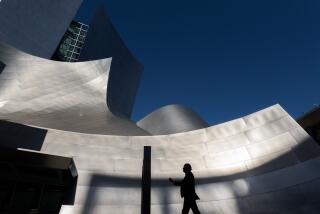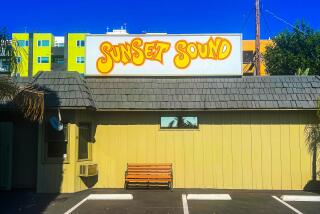Review: John Adams’ ‘Ceiling/Sky’ remains earthbound
When urban angst and unrest erupts in violence, as it did in Ferguson, Mo., our initial focus is necessarily on finding solutions to such apparent causes as racial profiling, unemployment and militarized police. But the underlying spiritual crises, the lingering human needs, may require something seismic.
Let the ground beneath your feet and the roof over your head become untrustworthy, and you will be handed an opportunity to sense the world and your place in it differently.
John Adams’ “I Was Looking at the Ceiling and Then I Saw the Sky,” his groundbreaking 1995 experiment in vernacular American music theater, is both a worldly and spiritual response to the 1992 Los Angeles riots and the Northridge earthquake that followed two years later.
That Long Beach Opera’s Southern California premiere of “Ceiling/Sky” occurred under artificially pleasant SoCal conditions Saturday night in the lovely John Anson Ford Amphitheatre in L.A. could hardly have been lost on anyone. The events in Ferguson and later the quake in Napa make this “earthquake/romance” shockingly relevant.
“Ceiling/Sky” is the least celebrated of Adams’ several essential collaborations with director Peter Sellars. It has had little exposure since the initial run of performances after the premiere in Berkeley. The complaints originally leveled against it were equal opportunity. Adams’ sophisticated show tunes were accused of being too complicated. June Jordan’s nuanced libretto was termed too tortured. Sellars’ intense production was too one-sided. The show, which has 20 musical numbers in a variety of popular styles and now spoken dialogue, could feel plodding.
“Ceiling/Sky” surely could stand revision. It plodded Saturday, especially with an unbalanced 73-minute first act and a second act half that length. But the show now really strikes raw nerves, in Adams’ music, Jordan’s words and the sheer prescience of Sellars’ original production. The show’s shocking relevance reminds us of just how little attention we have been paying to its issues over the past two decades.
Adams and Jordan were not the most amenable team. The activist Berkeley poet was not known for compromise, and that made her a great figure in the community but a less adequate collaborator in the extreme give-and-take demands of music theater. Even so, many of the songs do indeed find that elusive sweet spot between pop and opera. They’ve got a hook that stays with you longer than you might like and yet explore an emotional depth that contemporary Broadway wouldn’t dare attempt.
The characters are as easy to recognize now as then. Dewain is a young black man just out of jail on minor charges on his way to see his undocumented Salvadoran girlfriend, Consuelo, who fears her young son has been picked up by immigration officials. Dewain impatiently grabs two bottles of beer from a convenience story without waiting in a long line to pay. Mike, a white rookie cop, arrests him. Tiffany, an airbrushed anchorwoman with two concerns — her ratings and getting Mike to notice her — captures it all on video.
There is also David, a womanizing Baptist minister, and his girlfriend, Leila, a graduate student who works at Planned Parenthood. Rick is the star Vietnamese lawyer who defends Dewain, this being his potential third strike and making him liable to serve 45 years for stealing those beer bottles worth $4.39.
The earthquake topples everyone’s world. The prison walls collapse and Dewain escapes, his salvation giving his life new purpose to serve his community. Consuelo understands that her home is El Salvador. Mike is forced to confront that he’s gay. Leila is crushed by a pillar in the sanctuary where she and David are in surreptitious embrace, leaving the preacher to find meaning in life, death and sanctity. Tiffany and Rick, attracted by their mutual superficiality, might grow (a long shot, that one).
There is, in Adams’ and Jordan’s songs, spiritual seriousness but also sex. Adams grabs onto all kinds of influences, from Kurt Weill to James Brown and gospel, and providing everything from his personal Minimalist bounce to, in Dewain’s powerful “Song of Liberation and Surprise,” operatic transcendence.
Adams writes for unusually versatile singers equipped with Broadway goods and classical training. Most in Long Beach’s cast had a foot in both worlds, but Broadway, most of the time, won out. The women in particular struggled with pitch. The semi-staging rarely went beyond a comfort zone of Broadway clichés, whereas the value of “Ceiling/Sky” is reinvention.
Cedric Berry’s Dewain was the compelling exception. Bernard Holcomb as David, Zeffin Quinn Hollis as Mike, Andrew Nguyen as Rick, Lindsay Patterson as Leila, Zipporah Peddle as Tiffany and Holly Sedillos as Consuelo were also clearly invested in their characters but made them seem more conventional. They were, though, no doubt victims of circumstances, with far too much to master for a single performance.
The musical ground under these singer’s feet was solid. Long Beach Opera’s music director and the evening’s stage director, Andreas Mitisek, led an alert, supportive and rhythmically steady performance. He didn’t penalize soloists from the combo of keyboards, bass, electric guitar, clarinet, sax and percussion when it was their moment to steal $4.39 worth of hot solos. But uniformly aggressive amplification had the effect of flattening expression from singers and instrumentalists alike.
“Ceiling/Sky” is a richly existential “earthquake/romance” that suggested ways forward for society and for Broadway. Neither have listened. But Long Beach Opera had its own existential issues Saturday night by putting its money on Broadway. At the alfresco Ford, where ticket prices for this event began at $60 (and in a county venue!), the company seemed to be looking at the sky but seeing only the ceiling.
Twitter: @markswed
More to Read
The biggest entertainment stories
Get our big stories about Hollywood, film, television, music, arts, culture and more right in your inbox as soon as they publish.
You may occasionally receive promotional content from the Los Angeles Times.







